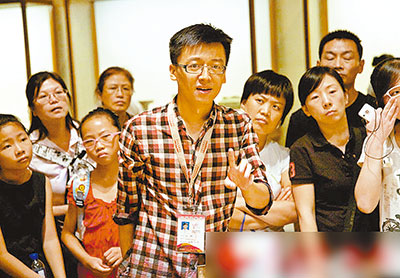
ON the east side of Beijing’s Tiananmen Square, the National Museum of China draws crowds with its rich cultural relics and artworks. But the world’s largest museum also boasts a “living treasure” — Zhang Peng, known as China’s most famous museum guide. After 15 years as a volunteer guide, Zhang has a large following in the museum and on social media. People ask for his duty roster in order to catch his tours. His book on the Forbidden City has sold out in downtown bookstores. Running children keep quiet when he starts speaking. They even address the 34-year-old as “brother.” Zhang started volunteering in 2003, when he was a law student at university. Unlike his schoolmates who looked for internships, he spent his time in museums. Born in Shaanxi Province, home of relics such as the terra-cotta army, Zhang loved learning about culture and history. He recalls being mesmerized by treasures he had only seen in textbooks on his first visit to the National Museum. Zhang learned his guide was a volunteer and he immediately delivered his resume. Two months later, he had a volunteer job. Every weekend, he would rise early, and take a two-hour bus trip from his campus to the museum. He would guide tours for four or five hours, and head home after dark. “I like being close to these precious relics. It’s fantastic,” he says, “and it is free.” Sometimes he also volunteers in other museums including the Forbidden City and the China Millennium Monument. Even after starting a paid job he continued to volunteer. In 2009, he won a national museum guide competition, which brought him national acclaim and accolades such as the “Beijing May Fourth Medal,” the highest honor for young Beijingers. Chinese museum guides have long been stereotyped as guides who stand firm, recite their scripts monotonously and have little personal interaction with their audience. However, Zhang believes he has the responsibility to show that a museum guide can be a good speaker and inspire people with a desire to learn. Zhang asks questions to involve his audience and enriches official scripts with interesting stories and academic arguments, encouraging audiences to think. When dealing with children he kneels at eye level and speaks simply so they can understand. Many primary schools now invite him to give lessons on cultural relics. “I have two cupboards of gifts made by my little audience members, including a girl’s note saying ‘Marry me’,” says Zhang with a blush. Since 2008, many Chinese museums have started to offer free admission and in turn, museum, exhibition and visitor numbers have grown rapidly. By 2016, China had 4,873 museums and more than 30,000 exhibitions were held annually, drawing 900 million visitors. Pictures of sensational exhibitions and rare treasures sweep social media, while books and documentaries are made into period dramas. “Well-known guides are gaining followers. They are one of the most enchanting features of China’s museums,” said Pan Shouyong, a professor of anthropology and museology at Minzu University of China. Museums are adapting to the new environment. “In the past, Chinese museums considered collections and research their priorities, but now they focus on the public,” said Pan. In 2014, Zhang resigned from his post at a State-owned enterprise and started a business that aims to educate teenagers about museums. He offers online and offline courses on exhibitions, sells books and organizes study trips abroad. It was difficult at first, but Zhang has confidence, as the government has called for social forces to participate in public culture services earlier this year. (Xinhua) | 
